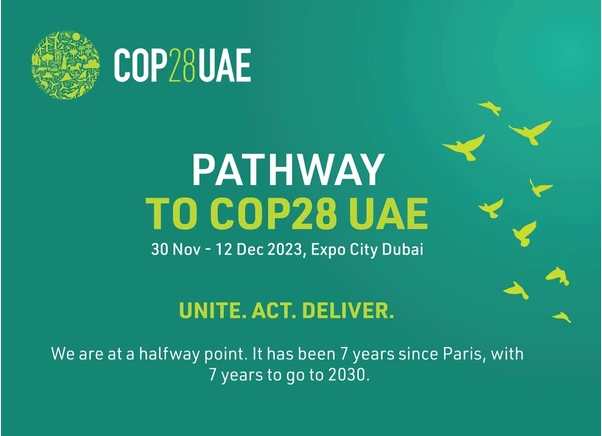
- Date
- 29th November 2023
- Categories
- Carbon Market Regulations, Clean Cooking, COP28, NDCs
By Dr Samir Thapa (MECS Programme, Loughborough University)
This is the first of three blogs that piece together the convergence of CoP28 aspirations, Carbon Market Regulations and the Nationally Determined Contributions (NDCs) on cooking. This blog highlights CoP28’s major agenda items and cooking context. The CoP28 President’s latest Letter to Parties expresses the need to reduce 22 Gt by 2030. IEA’s recent special report indicates the potential of avoiding 1.5 Gt from universal access to clean cooking in the same period, nearly 7 percent in the next 7 years. This avoidance will substantially increase if short-term black carbon emissions are also considered. Moreover, co-benefits through the avoidance of related medical costs and lost productivity could be around USD 1.4 trillion annually. Most importantly, women and children stand to benefit the most due to the avoidance of unpriced or undervalued drudgery, which is absolutely unfair from a human rights perspective. The concomitant socio-psychological and economic potential through agency and empowerment related to gender and social inclusion would be truly transformational. Despite these benefits, clean cooking has not featured directly in many developing countries’ NDCs, including in the First Global Stocktake communications.
It is however anticipated that clean cooking will feature prominently as a “Breakthrough Agenda” with dedicated events (E1, E2), including in the First Global Stocktake High Level events on Mitigation, and Adaptation, and their Means of Implementation, to be duly reflected in the subsequent NDC updates in 2025. Electric cooking together with the need to strengthen electricity network infrastructure, with scaled up investment in national and regional networks, will feature in different dialogues (e.g., GeCCo launch, Nepal Pavilion) as a critical enabler of both the renewable energy and energy efficiency transition. This is also because SDG clean cooking access target is grossly off track with a mere 12% increase over the past decade.
Given its substantial adaption benefits across CoP28 themes viz. gender, health, resilient food systems, nature/forests including climate/risk/recovery/peace, clean cooking agenda also need to be part of delivering the Global Goal on Adaptation Framework. The highly vulnerable 3.6 billion people inevitably includes the 2.6 billion people without access to clean cooking. Clean cooking solutions, therefore, should feature prominently as part of resilient and secure energy systems, with clear target and indicators of its contribution, primarily for forest conservation and related benefits. These early efforts going forward could pave the way for its inclusion in Article 6.8 non-market partnerships e.g., in relation to maintaining permanence and SDG benefits beyond carbon financing – with increasing renewable biomass in the forest stock.
As part of Article 6.2 implementation, while more than 60 mitigation projects have been bilaterally agreed between several countries, Ghana has gone ahead and authorised transfer of credits with Switzerland and both the countries are the first to submit the initial reports, as pre-conditions for the ITMOs transactions. Soon Ghana and Switzerland will submit initial reports for their (three) clean cooking projects in 2024. More dialogues, agreements and announcements on such clean cooking related jurisdictional programs is expected to materialise in CoP28 and beyond. Key developments have also been made for the implementation of Article 6.4 mechanism. Its Supervisory Body (SB) has adopted important documents viz. the standard and procedure for project development including their validation and verification standard1 to be effective from 1 Jan 2024. Standard and procedure for accreditation are also adopted and will be operational in the first quarter of 2024, with work progressing in parallel for the accreditation of auditors, adoption of the SDG tool and the Article 6.4 registry2 . Substantial clean cooking article 6.4 activities will happen in 2024, with expected final guidance on the approval of mechanism methodologies by CMA in CoP28 and starting with transitioning of the CDM clean cooking projects to Article 6.4 mechanism.
Many ongoing sectoral analyses shows concern that regulations developed under Article 6 will have an impact on the Voluntary Carbon Market (VCM). One key issue is corresponding adjustments (CAs) e.g., if CAs are required for VCMs, if countries can revoke CAs. These issues, together with developments on integrity, will feature prominently in events such as Accelerating High integrity voluntary and regulated carbon markets: The role of government. The country regulations e.g., Ghana have paved the way on addressing these issues, which maintains the “customer is king” principle e.g., CORSIA, thus allowing convergence between voluntary and compliance markets. Going forward such worries can be addressed with new rules given that the principal legislations and NDC intent are in place.
At CoP28, clean cooking could benefit from the possible new joint Coalition of Buyers, and announcements on use of credits by regional and country level carbon pricing mechanisms such as South Korea and South Africa – which already accept credits, including Singapore’s carbon tax scheme, expected in 2024. Further, there is an expectation that EU and UK ETS may allow limited use of removals. Given that key issues on removals are yet to be resolved, advocacy on clean cooking, especially for higher tier solutions, and benefits similar to forestry-based removals could be useful.
In summary, CoP28 is going to reflect the growing momentum for clean cooking, importantly for the higher tier services and the infrastructure required in digital innovations and energy/electricity infrastructure – with pledges on climate (adaptation, mitigation, results-based finance) finance and finance tied to robust carbon and social accounting.
Featured Image: Copyright of Shutterstock. Shutterstock.com
******************************************************************************************************
1 The Supervisory Body also adopted the standard and procedures for transition of CDM activities effective from 1 Jan 2024, with requirements for addressing non-permanence risk and assessing and monitoring environmental and social impacts based specifically on an analysis of the CDM clean cooking activities.
2 The Supervisory Body has approved recommendations related to development and assessment of mechanism methodologies and activities involving removals to the CoP28.